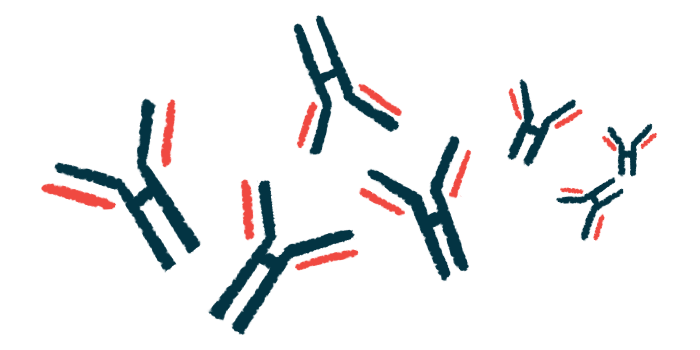1st Patient Dosed in Phase 1/2 Trial of Antibody Therapy ISB 1442
The treatment targets CD47, CD38 proteins on cancer cells, binds to immune cells
Written by |

The first patient has been dosed in Ichnos Sciences’ Phase 1/2 clinical trial investigating ISB 1442, an experimental bi-specific antibody treatment for people with relapsed or refractory multiple myeloma.
ISB 1442 targets two proteins on cancer cells, CD47 and CD38, and also binds to immune cells. These simultaneous interactions trigger an immune reaction that in preclinical studies have been shown to kill tumor cells.
The study is is recruiting and expects to enroll about 121 participants. It will take place in Australia and the U.S.
“The start of our first clinical study of ISB 1442 and dosing of the first patient are important milestones not only for patients with relapsed/refractory multiple myeloma, but also for Ichnos,” Cyril Konto, MD, president and CEO of Ichnos, said in a company press release. “Our work at Ichnos is built on the core belief that cure is possible, and we look forward to advancing ISB 1442 and other immune cell engaging antibodies with the aim of providing new treatment options for patients with hematologic malignancies and solid tumors.”
The design of ISB 1442 was based on a platform called BEAT, which was initially developed by Glenmark Pharmaceuticals. Ichnos, Glenmark’s subsidiary in the U.S., uses BEAT technology to engineer bi-specific antibodies that can potentially treat cancers.
This antibody is designed to bind to CD38, which is highly abundant on the surface of myeloma cells, and at the same time target and activate immune cells. ISB 1442 can also block CD47, a protein on cancer cells that allows them to escape the immune system.
“ISB 1442, developed on Ichnos’ cutting-edge BEAT 2.0 platform, has a unique mechanism relative to other CD38 or CD47-targeted antibodies, and has potential as a treatment for patients with both myeloma and myeloid malignancies,” Eric Feldman, MD, Ichnos’ chief medical officer, said.
The first-in-human Phase 1/2 study (NCT05427812) will evaluate the safety and effectiveness of ISB 1442 in adults with relapsed or refractory multiple myeloma.
In the first part, participants will receive escalating doses of ISB 1442 until the highest tolerable dose is identified. Researchers will assess its side effects and signs of toxicity.
Once this is determined, the second part will determine the percentage of patients who respond to treatment and the durability of the responses. Patients will be assessed for 18 months.
In this part, patients will be administered with the recommended dose determined in the first phase. Phase 2 includes participants with relapsed or refractory multiple myeloma who have received at least three prior lines of therapy, including proteasome inhibitors, immunomodulators, and anti CD38 therapies either in combination or as a single agent.
Ichnos’ lead asset, ISB 1342 (previously named GBR 1342) is being evaluated in a Phase 1 clinical trial (NCT03309111). This antibody targets CD3, a protein on the surface of T-cells, and CD38, at the same time.
The study aims to recruit 245 previously treated multiple myeloma patients at multiple sites in the U.S. and France. ISB 1342 was named an orphan drug as a potential treatment for multiple myeloma by the U.S. Food and Drug Administration in 2019.



